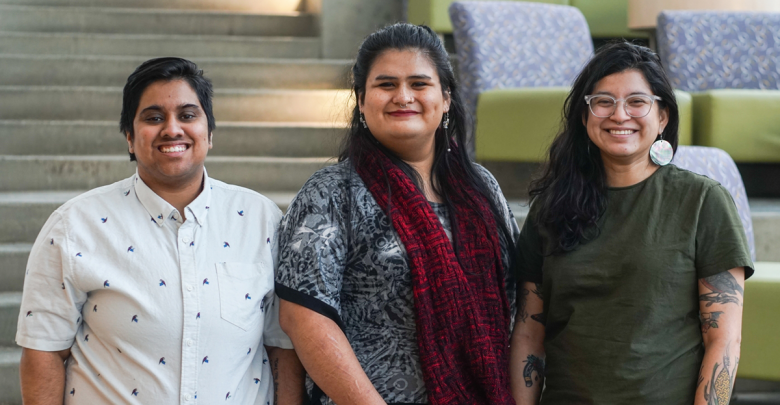At the intersections: Finding community with Shades of Colour
 Richard Bagan
Richard BaganNicole Jones-Abad, a psychology major at the University of Alberta, was missing a place where she could feel a sense of belonging. Then she joined Shades of Colour (SOC), an Edmonton-based group, run by and for trans and queer Indigenous and Black people and people of colour, that helped her find the community she was looking for.
At first, she was hesitant about joining SOC. She had doubts about her identity and validity as a woman of colour. But she soon realized that SOC provides a gathering place based on acceptance and inclusivity in ways she hadn’t found elsewhere.
“I just kept going [to SOC] more and more, slowly figuring out that it was a place I could be,” she said.
Less than a year later she became an executive member, and has since been helping to run the group’s social media, write speeches, and more. Jones-Abad’s story reflects the group’s intentions: SOC offers a communal space for those who are searching — even if they aren’t sure what they’re searching for. Those navigating their identity in any sense are welcome in SOC, founding member Rohan Shyne Dave said. Knowing exactly who you are isn’t a prerequisite to join.
Dave is a counsellor and former program and volunteer coordinator at The Landing, a society that supports queer students at the U of A. He said SOC began taking shape in 2014, when he and a group of queer people of colour noticed a lack of space on campus for those with their intersections. They found that with other mainstream LGBTQ and POC groups, there was still a disconnect.
“A lot of people with our intersections… often feel between communities,” Jones-Abad said. “It creates this gap, this need, of where you feel you can exist.”
SOC started as a facet of The Landing, but has since expanded into the Edmonton community. As of fall 2018, the group has also partnered with the Alberta Public Interest Research Group.
For a community that otherwise might not have felt belonging elsewhere, SOC has become a home base. Dave and Jones-Abad said they recognize the distinct experiences that queer and trans POC share, and the importance of cultivating a community specifically for them.
“With our identities, people aren’t just facing transphobia and homophobia,” Jones-Abad said, “but also facing intergenerational trauma and the effects of colonialism and racism, that intersect in a lot of ways and create something very hard to deal with.”
SOC addresses the importance of providing a space for those who feel between groups and the negative impacts felt when those spaces don’t exist. Dave and Jones-Abad said queer and trans people of colour are highly prone to mental health issues and often face challenges when seeking help, from financial barriers to a difficulty finding supports that fit their needs.
“A lot of the time, trans and queer Indigenous and Black people and people of colour don’t have access to mental health resources,” Dave said. “As a result of that, informal communities of support start to develop… to give people a sense of community that is otherwise not accessible.”
Folks of any age are welcome at meetings, Jones-Abad and Dave said, which fosters an intergenerational community where members can learn from and support each other. No matter what they are facing, members have a place to connect and enjoy themselves.
“The very big premise of what we do is, [and] we think it’s a really political act, [is] to eat food together and not have to talk about trauma,” Jones-Abad said.
From its beginnings as an extension of a student-focused organization at the U of A to becoming an intergenerational community, SOC has come a long way. Running on donations and fundraisers by groups such as the U of A Bollywood Dance club, they’ve managed to cultivate an independent and spirited community. But they aren’t planning on slowing down. They hope to take on more projects, expand their team, and find a space for SOC to settle down and call home.
“As we continue to grow, we’ve understood the intentionality behind the project and why it needs to exist,” Dave said. “It’s a significant space in our community.”




